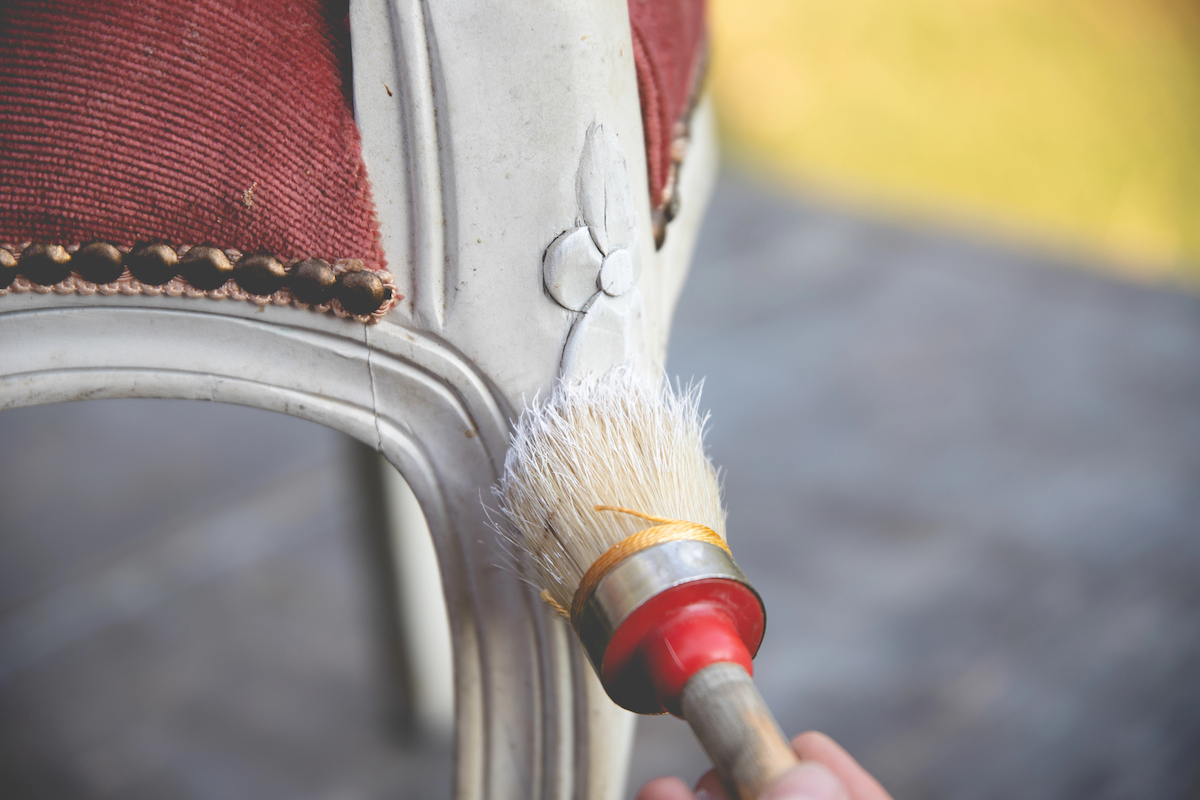

We may earn revenue from the products available on this page and participate in affiliate programs. Learn More ›
Putting a new face on tired-looking home accents can be as simple as brushing on a few coats of paint. But if you want to achieve a unique antique-style finish, think outside the conventional can of latex paint and opt for chalk paint instead.
A water-based decorative paint developed and made popular by Annie Sloan, chalk paint is a nondamaging blend of calcium carbonate, talc, and pigments that delivers a whimsical matte white finish with chalk-white undertones. It has become the veneer of choice for DIYers looking to revive their outdated wooden furnishings, although it’s also suitable for use on masonry, drywall, metal, glass, and fabric.
Before You Begin
If it’s at all feasible, work on your paint project indoors. Chalk paint adheres best at room temperature. Protect the floor of your work space from paint splatter by laying out newspaper or a drop cloth under the piece you’re painting.
Tools & Materials
Bobvila.com may earn a commission from purchases made through these links.
How to Apply Chalk Paint

How much chalk paint should you purchase for your project? Typically, a liter of chalk paint can cover 140 square feet, which is roughly the surface area of a small dresser. It is also possible to make your own chalk paint, though you aren’t likely to save a lot of money by doing so unless you already have latex paint at home.
Step 1: Remove hardware.
Detach any removable elements, such as cushions, shelves, drawers, hinges, knobs, and hardware, from the workpiece.
Step 2: Prepare surfaces for painting.
Preparing furniture to be painted is pretty straightforward: Chalk paint can adhere to most surfaces, so there’s no need to sand wood furniture (even if you’re working with varnished wood pieces), or prime it, before introducing the chalk paint. That said, there are some furniture finishes that will need special preparation before chalk paint is applied.
- Paint-covered, rust-covered, or high-gloss surfaces like laminates could use a light sanding with 150-grit or finer sandpaper in order to remove obstacles to adhesion.
- Untreated wood should have a coat of clear shellac applied with a cloth rag before chalk paint is applied. Cure the shellac according to the manufacturer’s instructions. This coat prevents tannins in the wood from bleeding into the paint and altering the color.
Before applying chalk paint, clean furniture and other items carefully: Using a soft cloth saturated in soapy water, wipe down the entire surface of the piece to lift dirt, debris, oil, and sanding dust. Give the surface a once-over with a clean, damp cloth, then let it dry completely. Cover any areas you don’t want to paint with painter’s tape.
Step 3: Apply the first coat of chalk paint.
Before opening the paint can, turn it upside down to loosen the contents, then shake it to ensure that the chalk paint is well mixed.
Depending on the size of the object you’re painting, you can use a brush, roller, or spray gun to apply chalk paint.
- To apply chalk paint with a brush: For a smooth, uniform finish, choose a natural-bristle paint brush with long, flexible bristles. Dip the brush into the can, and tap the handle against the lid of the can to remove excess paint. Then, apply the paint in unidirectional strokes to one section of the piece at a time until the entire surface is covered.
- To apply chalk paint with a paint roller: Pour the chalk paint into a paint tray, then load it onto a high-density foam paint roller (depending on the size of the furniture, a 4-inch mini roller may be the best option). Scrape off the excess paint on the grid of the pan. Roll a thin layer of paint in a long, unidirectional stroke, then pull it back and make one more stroke in the original direction. Repeat this process until the entire surface is coated.
- To apply chalk paint with a paint sprayer: Chalk paint is a naturally thick medium that may not flow readily from all paint sprayers. One fix for this problem is to water down the chalk paint (adding approximately 2 tablespoons of water for every cup of paint) before loading it into the gun. Or, you can load the paint as is and operate the gun at maximum pressure, preferably with a spray tip measuring at least 1.8 millimeters to enable the fluid to flow. To avoid damaging your spray gun, test this method on a small, inconspicuous area of the piece before tackling larger areas.
Allow the first coat to dry completely according to the manufacturer’s instructions.

Tried-and-True Advice
“I love how resilient chalk paint is when working over different surface types. Temperature is the most important variable for adhesion, so set the thermostat to 65 degrees indoors before painting. This makes a surprising difference and allows the paint to set properly. For outdoor application, choose a day with mild but warm temperatures for the same reason.
We have a habit of thoroughly prepping and cleaning surfaces for painting. Chalk paint offers an exception to the normal paint-prep rules. When painting furniture and wood surfaces especially, moderate to little prep is required. Skip the heavy sanding and jump right into the painting process.”
—Zach Lazzari, Contributing Writer
Step 4: Apply a second coat of paint, if needed.
A single coat of chalk paint is sufficient for many applications. If, however, you need to cover any visual imperfections, or if you want to create a two-tone decorative finish in which the bottom layer of paint shows through around the distressed edges, you can opt to apply a second coat in the same color or a lighter shade.
Step 5: Distress the surface with medium-grit sandpaper (optional).
Examine the finish. If you want a more polished matte look, keep it as is. Otherwise, to achieve a subtly worn patina, distress the painted surface with medium-grit sandpaper, focusing on the edges or details you want to accentuate.
Step 6: Apply wax sealer.
When you’re happy with the finish, seal the paint with one or more coats of clear or tinted wax, gently massaging the wax into the painted surface with a soft wax brush. As a rule of thumb, use a 500-milliliter tin of wax for every 3 to 4 liters of paint. Although wax can dry in less than a half hour, it’s best to let it sit overnight. Total curing of the wax can take up to 3 weeks, although the furniture is ready to use as soon as the wax is dry.
Step 7: Replace hardware.
Reinstall hardware, shelving, or other elements that you you removed from the piece, and let your upcycled accent piece shine!
